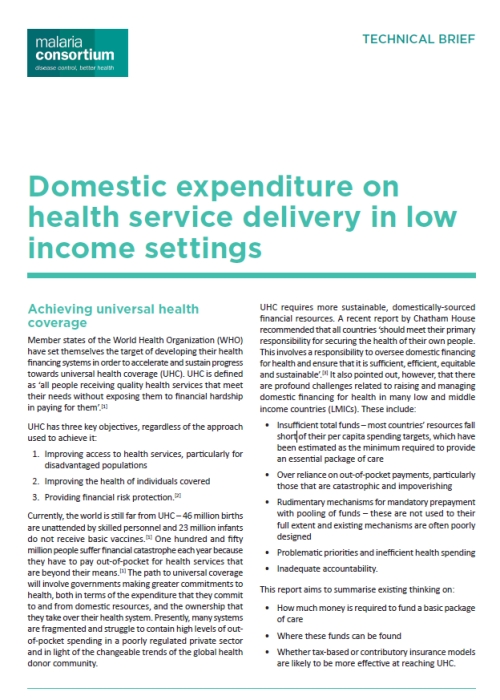
Publication Date:
10/09/2018
Author:
Natasha Palmer
James Tibenderana
Type:
Technical brief

Domestic expenditure on health service delivery in low-income settings
Publication Date:10/09/2018
Author:
Natasha Palmer
James Tibenderana
Type:
Technical brief
To accelerate progress towards universal health coverage (UHC), member states of the World Health Organization (WHO) have agreed to develop further their health financing systems. UHC is defined as ‘all people receiving quality health services that meet their needs without exposing them to financial hardship in paying for them.’
Currently, the world is still far from UHC — 46 million births are unattended by skilled personnel and 23 million infants do not receive basic vaccines. One hundred and fifty million people suffer financial catastrophe each year because they have to pay out-of-pocket for health services that are beyond their means.
The path to universal coverage will involve governments making greater commitments to health — both in terms of the expenditure they commit to and from domestic resources — and the ownership they take over their health system. Presently, many systems are fragmented and struggle to contain high levels of out-of-pocket spending in a poorly regulated private sector and in light of the changeable trends of the global health donor community. UHC requires more sustainable, domestically-sourced financial resources.
This report aims to summarise existing thinking on:
- how much money is required to fund a basic package of care
- where these funds can be found
- whether tax-based or contributory insurance models are likely to be more effective at reaching UHC.
Keywords: Community delivery | Costing and economic impact evaluation | Research | Advocacy | Health system strengthening | Quality improvement | SDGs
« Back to Publications